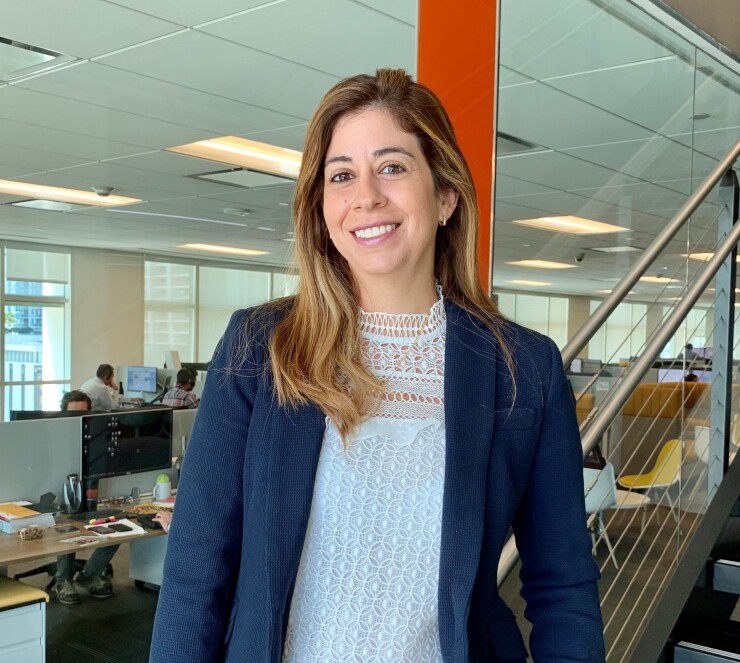Visa and
Latin America has one of the highest rates of female entrepreneurs worldwide, but most Latin American women-led businesses can’t grow beyond the category of microenterprise.
“We want to help women entrepreneurs move beyond having a single store,” said Kiki del Valle, Mastercard’s senior vice president of digital partnerships for Latin America and the Caribbean.

In Latin America, half of the population is unbanked, and 70% of women have control of purchasing power in their households, del Valle said.
“It’s important for us, from a commercial perspective, to stay close to women in Latin America," she said. "As well as
Among its Latin American educational partnerships, Mastercard is training women entrepreneurs with Connect Americas for Women, a B2B platform owned by the Inter-American Development Bank, and INCAE Business School’s Center for Collaborative and Women’s Leadership. The three organizations are developing a virtual accelerator for Latin American women entrepreneurs.
Visa has its own initiatives focused on women entrepreneurs. In 2017, Visa launched the
The Visa Foundation’s first initiative was a $20 million grant to Women’s World Banking. Visa is helping Women’s World Banking to provide underserved women business owners with access to appropriate financial services products and advice.
“We aim to ensure women aren’t forgotten in the financial inclusion efforts that are occurring globally,” said Karen Miller, Women’s World Banking’s vice president of knowledge and communications. “When we start working in a country, we examine the cultural barriers and find solutions for women, for example explaining that using digital savings accounts is safer than carrying cash.”
As an example, the Indian government’s Aadhaar digital ID system has led to many women getting bank accounts. “But often Indian women’s accounts are dormant, as they don’t understand how to use them,” said Miller. “Indian women often form self-help lending groups, so we’re working with a bank called Ujjivan to design savings products leveraging these self-help groups.”
Only 7% of Pakistani women have bank accounts, according to the World Bank, yet 70% of Pakistani women have mobile phones. Jazz, Pakistan’s largest mobile operator, wanted to increase adoption of its JazzCash mobile money service among women.
“JazzCash was geared to men, and women weren’t comfortable using it, leading to low female usage,” said Miller. “The primary way to open JazzCash accounts was through an agent, who would ask for the applicant’s cellphone number. But 95% of JazzCash’s agents were men, and Pakistani women don’t give their mobile numbers to unfamiliar men."
The solution was to work with Unilever Pakistan to train Unilever’s women resellers as JazzCash sales agents, Miller said. "We also enabled women to sign up for JazzCash directly on their phones or via SMS referrals from other JazzCash users.”
Gig economy
Mastercard sees the gig economy as benefiting women. Many gig economy firms are run by women, said Jennifer Rademaker, Mastercard’s executive vice president of global customer delivery. Gig workers often lack budgeting skills to cope with the infrequent income that is normal for contractors, she said.
“Phone bills and credit card statements are predicated on people having regular monthly income,” said Rademaker. “We use technology and education to address the budgeting gap between freelancers’ monthly outgoings and their variable income.”
With Care.com, which provides services such as caregiving, Mastercard is testing Mastercard Send push payments to freelancers plus a mobile budgeting app helping them allocate their funds.
Mastercard Send allows gig economy companies to push payments at any time to debit cards so contractors get paid on demand.
“If you’re having trouble coping financially, you don’t have to wait for regular payments from Care.com,” said Rademaker. “You can ask them to push payments whenever you want for 50 cents per payment. Our research shows the budget gap forces people to turn to payday lenders. There’s now enough traction with Mastercard Send payments that I want to see if we can use Mastercard Send to keep consumers away from payday lenders.”
Mastercard worked with the Egyptian government to use push payments to speed up alimony for divorced women.
“They had to queue at government offices to get alimony from ex-husbands, which was time-consuming and stigmatizing,” said Rademaker. “Working with the government, we’ve enabled monthly alimony to be disbursed to mobile wallets that women sign up for from their mobile operator. We want to find similar opportunities around the world to make these kinds of payments easier for women.”
Mastercard is forming alliances to help women small business owners. “For many women in the gig economy, the next step is to formalize their gig and become small business owners,” said Rademaker. “We want to help the woman who sold on Etsy as a hobby and was so successful she started a small business.”
In March 2019, Mastercard announced a partnership with Create & Cultivate, a U.S. online community that helps women develop their careers, and launched the Mastercard Women’s Business Advisory Council. Mastercard also partnered with Astia which sources investments for women entrepreneurs.
Mastercard is working with microfinance organization Grameen America and
“If women are empowered financially, there’s a knock-on effect for their children and broader family,” Rademaker said. “But to really help women, we need to focus on solving their everyday challenges.”





